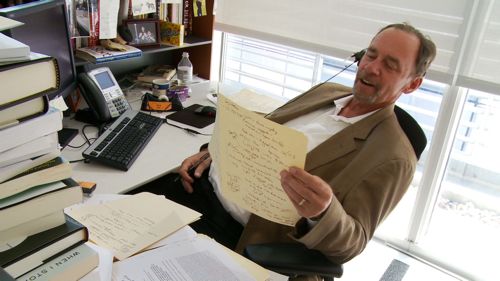Previously published at WGBH News.
My two favorite stories about Jill Abramson both speak to her insistence on holding The New York Times to account. Those stories may help explain why she was removed as executive editor on Wednesday.
The first pertains to investor Steven Rattner, a friend of publisher Arthur Sulzberger Jr. who was being investigated by the Securities and Exchange Commission over a kickback scheme involving the New York State pension fund. (In November 2010 Rattner paid a $6.2 million settlement and accepted a two-year ban on some of his trading activities.)
According to The New Yorker’s Ken Auletta, Abramson — then the managing editor, serving as Bill Keller’s number two — didn’t hesitate to green-light a front-page investigative report on Rattner, the Sulzberger connection be damned. “What better test is there for an editor than how they handle the publisher’s best friend?” Auletta quoted an unnamed Times source as saying.
To Sulzberger’s credit, the incident didn’t prevent him from naming Abramson to succeed Keller in 2011. But what may have created an irreparable breech was a second, similar story. In 2012, Sulzberger chose Mark Thompson, the former director general of the BBC, to become chief executive officer of the New York Times Co. Before Thompson could begin, Abramson dispatched one of the Times’ top investigative reporters to look into whether Thompson had any role in the child-sex-abuse scandal whirling around Jimmy Savile, a once-popular TV host.
Both Thompson and Sulzberger were angry, reports Gabriel Sherman in New York magazine. A source was quoted as saying of Sulzberger: “He was livid, in a very passive aggressive way. These were a set of headaches Jill had created for Arthur.”
Now the Times’ internal top cop is off the beat. And Thompson, presumably, has a freer hand to enact his agenda — an agenda that is said to include, among other things, more online video and more native advertising, the term of art used to describe what used to be disparagingly referred to as “advertorials.”
Abramson’s successor and former number two, Dean Baquet, is now the paper’s first African-American executive editor, a not-insignificant milestone on a par with Abramson’s being the first woman. He is said to be a fine editor and a popular choice with the newsroom.
But given that Sulzberger’s own son recently wrote a report arguing that the Times isn’t moving quickly enough on the digital front, it might seem strange that Abramson’s successor would be someone regarded as even less digitally savvy than she. The likely explanation is that Thompson sees himself as the paper’s chief digital officer. Certainly Thompson does not lack for confidence. Less than a year ago he supposedly told a Times executive, “I could be the editor of the New York Times,” according to an article by Joe Hagan in New York magazine.
I don’t mean to play down any of the other reasons that have been given for Abramson’s abrupt and brutal dismissal. There is the matter of her brusque demeanor, described in detail last year by Dylan Byers of Politico. At the time I dismissed it as anonymously sourced sexism, but Byers is deservedly taking a victory lap this week.
Another factor was her complaints about making less money than Bill Keller did when he was editor, a story Ken Auletta broke within hours of Abramson’s dismissal. Auletta reported that Abramson even learned she made less than a male deputy managing editor when she was managing editor. The Times has denied all, although in language that makes it hard to figure out what, precisely, it is denying.
And then there is the incident that may have precipitated the final crisis — her reported attempts to hire Janine Gibson away from The Guardian to serve as a co-managing editor for digital without bothering to inform Baquet. Certainly that’s the angle that the Times’ David Carr and Ravi Somaiya play up in their own coverage of Abramson’s dismissal. (Other accounts say Gibson would have been a deputy managing editor, and thus presumably less of a threat to Baquet’s authority.)
Still, none of these reasons sufficiently explains why Sulzberger believed Abramson needed to be dealt with so harshly. She was all but hustled out of the building, treated like Howell Raines after he was dismissed for enabling a plagiarizing, fabricating young journalist named Jayson Blair. By contrast, the Times under Abramson’s editorship has been a journalistic success and has done reasonably well financially at a time when the news business has been imploding, as Matthew Yglesias explains at Vox. (Vox also takes the prize for the best Abramson headline: “Tattooed, puppy-stealing badass editor Jill Abramson out at the New York Times.”)
“I think what it says to us is there is still enormous challenges for women out there, for women who assume those key and influential roles in journalism,” Melissa Ludtke, a pioneering sports journalist and former editor of Nieman Reports, told Politico’s Anna Palmer.
I think it’s more complicated than that. It is nevertheless a fact that in the past few years Sulzberger has fired two of the highest-ranking women in the newspaper business — first Janet Robinson, creating the vacancy that Mark Thompson later filled, and now Abramson.
In addressing the staff Wednesday, Sulzberger referred to “an issue with management in the newsroom.” That’s not good enough. And it’s not the kind of accountability Abramson pushed for in covering the powerful institution that she worked for. I hope we’ll learn more in the days ahead.




